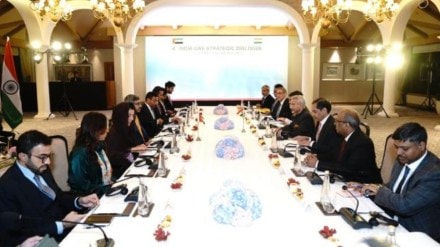India and the UAE have taken their Comprehensive Strategic Partnership to new heights, with significant agreements and collaborations emerging from the India-UAE Joint Commission Meeting (JCM). Co-chaired by India’s External Affairs Minister S Jaishankar and UAE Foreign Minister Sheikh Abdullah bin Zayed Al Nahyan, the meeting underscored the two countries’ growing ties across multiple sectors including trade, energy, defence, and scientific research.
Trade and Economic Growth
Trade and economic cooperation formed a central theme of the discussions. Jaishankar highlighted that the Comprehensive Economic Partnership Agreement (CEPA) has greatly facilitated bilateral trade, which now totals USD 85 billion. He expressed optimism about reaching the USD 100 billion target for non-oil trade. “The success of the CEPA is a testament to the dynamic economic relations between our nations. We have built a diversified trade network, and we expect these figures to continue growing,” Jaishankar noted.
Both sides also discussed new technological platforms such as the Virtual Trade Corridor (VTC) and the Maitri Interface, designed to enhance trade efficiency by enabling paperless transactions. Jaishankar added, “These initiatives will streamline trade and make our processes more effective, paving the way for even stronger commercial ties in the future.”
Energy Cooperation and Future Prospects
The energy sector remains a cornerstone of the India-UAE partnership. The two countries reviewed their ongoing collaboration in oil and gas, while also exploring future avenues in renewables and green hydrogen. The minister mentioned, “Our partnership in the energy sector has evolved to include new areas, such as renewable energy and nuclear power. These are crucial for both our countries as we look toward a sustainable energy future.”
Moreover, both nations discussed nuclear energy cooperation, which is expected to play an increasing role in their energy strategies. Investments in critical infrastructure, such as strategic reserves and energy security projects, were also a part of the ongoing dialogue.
Defence and Security Collaboration
The defence sector is another area where India and the UAE have made considerable strides. Jaishankar highlighted the growing importance of bilateral defence exercises and collaboration in ensuring regional security. The Desert Cyclone exercise, held earlier in 2024, marked a milestone in military cooperation, and the formation of a Defence Partnership Forum between the two countries is expected to further enhance their strategic ties.
He added, “Our military cooperation is growing, with shared goals of enhancing regional security. These efforts go beyond just exercises—they are part of a broader strategic framework that serves the interests of both countries.”
Discussions also touched on regional security, particularly in the context of West Asia, where both nations share concerns over stability. Prime Minister Modi has consistently reiterated India’s commitment to supporting long-term peace and security in the region.
Polar Research and Scientific Collaboration
A notable outcome of the JCM was the signing of a Memorandum of Understanding (MoU) on Polar Research. The MoU between India’s National Centre for Polar and Ocean Research (NCPOR) and the UAE’s Emirates Polar Mission opens the door for collaboration in polar studies, focusing on joint research, capacity-building, and academic exchanges. Jaishankar commented, “This collaboration will enhance our scientific cooperation and support groundbreaking research in polar regions.”
The partnership will also promote greater cooperation in oceanography, with a focus on research and operations in the Arctic and Antarctic regions, as well as joint academic initiatives.
Education and People-to-People Engagement
Education and cultural exchange were also key areas of discussion. India and the UAE are enhancing educational cooperation with the establishment of Indian institutions in the UAE, such as IIT Delhi and IIM Ahmedabad, as well as the Symbiosis University campus in Dubai. Jaishankar noted, “The opening of IIT Delhi in Abu Dhabi and other Indian campuses in the UAE is a significant step in our educational collaboration. We are creating opportunities for students from both countries to engage in world-class academic exchanges.”
With over 3.9 million Indians living in the UAE, the two nations also discussed the vital role of the Indian community in fostering deeper cultural ties.
On Thursday (Dec 12, 2024) Prime Minister Modi in his meeting with the visiting leader expressed his appreciation for the UAE’s support of the Indian diaspora, stating, “The Indian community is an essential bridge between our two nations, contributing significantly to both our societies.”
Multilateral Cooperation and Global Issues
India and the UAE also discussed their growing partnership on the global stage, particularly through multilateral forums such as BRICS, G20, and I2U2. Both sides have made concerted efforts to leverage these platforms to address global challenges and promote sustainable development.
The India-Middle East-Europe Economic Corridor (IMEEC), a major regional connectivity initiative, also featured prominently in the discussions. The IMEEC, aimed at improving maritime trade and infrastructure between India, the UAE, and Europe, is expected to enhance connectivity and bolster economic growth across the region.
